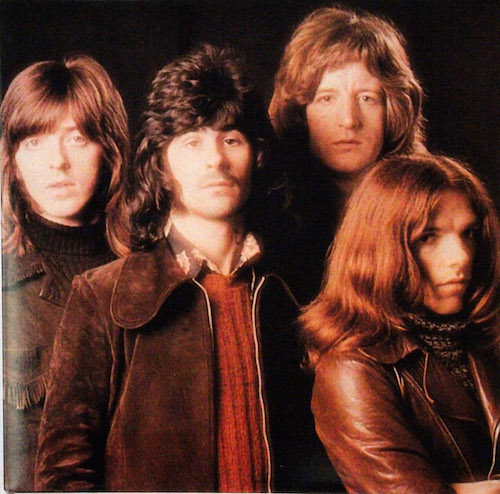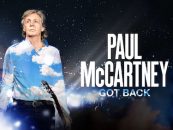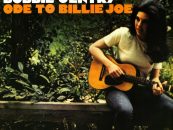
Joey Molland of Badfinger, 2017 (Photo by Beth Kintner)
The world of rock music is an unparalleled petri dish of larger-than-life personalities engaged in high-stakes dramas, but even within that realm, few stories feature turmoil and tragedy to compare with the history of Badfinger. This was to be a charmed musical life: the first band signed to Apple Records in 1968, which within two years would shuffle its membership, change its name and—on the strength of a song hand picked for it by Paul McCartney—score the first of multiple worldwide hits that remain rock staples today. Yet for all that early success, the band ultimately would be defined by mismanagement, internal frictions and the deaths of two principal members.
Badfinger has never really moved past 1975. Following questionable handling of funds by manager Stan Polley, the group found itself at an impasse with its second label, Warner Bros., which ceased promotion of its then-current project and refused its next one. Cut off from funding and unable to extricate the band from an onerous agreement with Polley, in April of that year, lead singer Pete Ham hanged himself in his garage studio. The group dissolved soon after, only to reunite in 1978 with two (and soon after, three) of its signature quartet. Later albums failed to catch on and no lineup lasted for long. That led to two principals fronting separate versions of Badfinger simultaneously in 1982 and ’83, a rivalry that ended in disaster when bass player Tom Evans took his own life. Despite its many misfortunes, Badfinger has consistently existed in some form or another since its initial reunion.
In recent years, the band’s legacy has been preserved primarily by Joey Molland, the lone surviving member from that defining period. That the Liverpool native’s U.S.-based Badfinger is now one of two to lay claim to the name is somewhat ironic given that Molland led one of the competing factions in the early 1980s, but only his has the pedigree of a member who was present for the band’s glory years. (The other is led by Bob Jackson, member during some non-peak eras, making his claim to its name akin to if, say, Gary Cherone hired three musicians to build his own Van Halen; arguably allowable on a technicality, but more opportunistic than appropriate.)
[Molland died in March 2025.]
In a January 15, 2017 performance at the Wolf Den lounge in Uncasville, Connecticut’s Mohegan Sun Casino, Molland’s band struggled with details, but got the broad strokes right in an economical survey of the band’s history, from good times and bad.
The four-piece, reduced from five following the 2015 death of longtime guitarist Billy Davis, is built for the sort of contoured, full-bodied rock that defined the night. A robust segment of 1971’s Straight Up kicked off the show, retaining the album’s sequencing as it moved from the steady opener “Money” to the plump chug of “Flying.” Molland struggled to compete with his accompaniment, his 69-year-old’s singing game but craggy, but did his part with limber guitar licks, drizzling them across the stout throb of “Suitcase” as Greg Inhofer’s keyboards gave it a rattling honky-tonk edge.
One of the band’s strongest assets is its story, which in the right hands would translate to an incredible Broadway musical. Molland, born June 21, 1947, gave only small glimpses into that checkered history, crediting Ham and Evans for their contributions to the legacy he champions. Among those moments was a deliberate, reserved trip thorough the now-standard “Without You,” in which Molland’s singing was notably conservative. One missed chance to reminisce came when Molland lost track of the song on tap, and as a result offered the McCartney-penned staple “Come and Get It” without preamble. The rendition of the song itself was a bit of a mixed bag—thick and catchy as ever, but a touch out of sync as the band tried to work out where it was going in its latter stages.
Watch Molland perform “Come and Get It” on June 10, 2017
The set list was an appropriate mix of Badfinger signature numbers, band tunes in which Molland had a hand and material from his solo career. It spoke a bit to his sense of time over such a long career that when he dug into his 2001 solo collection This Way Up for “Happy,” he mused that it was “about five years old.” Included were a couple of songs from the Badfinger projects that followed Ham’s death, among them a boisterous trip through “I Got You” from 1981’s Say No More that found Inhofer bolstering Molland’s licks on a second electric guitar.
Inhofer and bass player Mark Healey handled vocals with regularity, including the latter’s easygoing take on “We’re for the Dark” atop Inhofer’s organ lilt. Healey’s bass put Beatles-like spring in the floor of “Baby Blue,” which Molland was quick to remind the audience led a resurgence of Badfinger awareness in 2013 when it was featured in the final episode of Breaking Bad.
Watch Molland perform “Baby Blue” a few months later
Molland’s own “Dream of Thunder” made for a blowout rock set piece, giving the band opportunities for interplay complemented by drummer Mike Ricciardi’s reactive flourishes. He spent portions of the set chasing after the direction Molland forged, but always delivered an escape route when a solution was needed.
Related: Badfinger’s Straight Up, a power pop masterpiece
Molland didn’t try to hide his struggles to wrap his voice around the night’s tunes, laughing, “It’s getting toward the end—you can hear that,” before making way for Healey’s lead on the classic “Day After Day.” He stuck with the program as best he could, rendering a guitar figure that added propulsive snap to the full-bore rock of “Moolah Rey.” He was essentially a dance band director as the show accelerated toward its finish line, from the bouncy “Vampire Wedding” to the piano-lined chug of “No More,” before closing with the still-buoyant 1970 tune “No Matter What.”
Watch Molland and several other stars perform “Day After Day” in 2018
Molland responded to a call to return, offering as an encore “Mean, Mean Jemima,” a 1971 track that saw its release as a bonus cut on the 1992 remaster of the 1970 album No Dice. Its infectious swivel was less familiar than much of the show, but like the songs before, provided easy transport to the time when it was new.
Joey Molland’s Badfinger, January 15, 2017 Set List
Money
Flying
Suitcase
Come and Get It
I Don’t Mind
We’re for the Dark
Happy
Baby Blue
Dream of Thunder
Take it All
Without You
Day After Day
I Got You
Moolah Rey
Midnight Sun
Vampire Wedding
No More
No Matter What
Mean, Mean Jemima
Related: A 2021 collection revisits the band’s songs, with guest stars








7 Comments so far
Jump into a conversation“One missed chance to reminisce came when Molland lost track of the song on tap, and as a result offered the McCartney-penned staple “Come and Get It” without preamble.” Er, maybe because he had nothing to do with the record?
Exactly.
To suggest Badfinger was a victim of “questionable handling of funds” is a major understatement. Stan Polley robbed them blind!
And never forget Molland’s greed drove Evans over the edge.
Thank you for writing a Review for Joey Molland’s concert! Since he’s made the effort to perform since 1970, and still played Badfinger’s music with a road worn voice…look forward to a show close by soon. Thank you!
Molland didn’t appear on the original Badfinger recording of “Come and Get It”. Interestingly also Molland was t an original member of Badfinger coming on board after much of “Magic Christian Music” but you are right that he was there for the main period with Apple and after Ham died.
Joey Molland was and still is an opportunist. Taking credit for “Without You” a Pete Ham song when he accepted American Society of Composers, Authors and Publishers (ASCAP) in 1995. He also released Badfinger Live (1990) without the awareness or consent of Mike Gibbins or the families of the late Pete Ham and Tom Evans. Molland is also not the only surviving member of Badfinger. Ron Grifith (1967-1969) and Bob Jackson (1974-1975) are still alive.
Joey Molland is awesome! This man was not only a member of Badfinger, he played on John and George’s solo albums and shared the stage at Bangledesh. He’s the nicest man you’ll ever meet.
wouldn’t it be great to have Joey to be joined by Ringo, and Paul and somebody else that the 3 of them agree to, and do about 175 shows in the U.S, !!